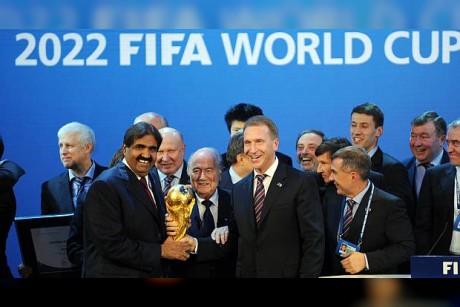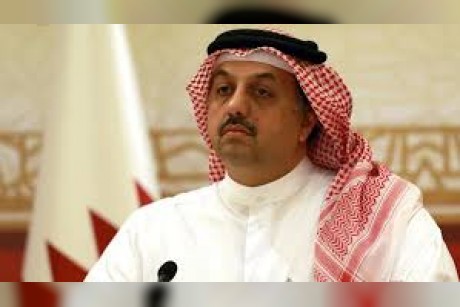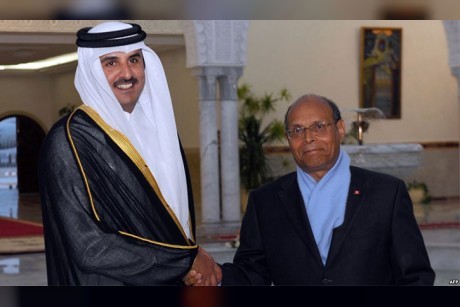A senior FIFA official took at least $1 million bribes to vote for Qatar to host the 2022 World Cup, a witness testified in court on Tuesday, as part of a broad investigation into corruption at FIFA.
Julio Grondona, a senior vice-president at FIFA and head of the Argentinian football association until his death in 2014, allegedly told the witness, Alejandro Burzaco, an Argentinian sports marketing executive, that he was owed the money in exchange for his vote, which helped Qatar secure the lucrative tournament.
Qatar’s victory, announced in December 2010 after four rounds of knockout voting by FIFA’s 22-person executive committee in Zurich, has been plagued with allegations of bribery and misconduct. The sworn testimony, given in a New York City court on Tuesday, is some of the strongest evidence the 2022 vote was tainted.
Burzaco, the former CEO of Argentine sports marketing executive Torneos y Competencias, has already pleaded guilty to handing out millions of dollars in bribes to senior South American football officials in exchange for broadcast rights to major regional tournaments.
His testimony on Tuesday alleges a sustained program of annual and one-off bribes, often over $1 million a time, to a group of influential executives on South America’s footballing body, Conmebol, over a period of around a decade.
Burzaco testified that while he was arranging a $1 million bribe payment to Grondona and another $1 million bribe to another senior FIFA executive, Ricardo Teixeira, Grondona informed Burzaco he had taken a bribe for his World Cup vote. In total, the former executive said, he had arranged $15 million in bribes for securing the rights to Copa America, which at that point were held by a rival marketing company.
Burzaco said that Grondona told him in January 2011 to also pay him Teixeira's $1 million Copa America bribe, which the Brazilian “owed him” as “Grondona voted for Qatar to host the 2022 World Cup”.
The marketing executive had accompanied Grondona, Teixeira and Nicolás Leoz, then the Conmebol president, to Zurich for the vote in 2010 and had heard of their intention to back Qatar.
“It was not a private thing,” Burzaco said.
As the voting got under way, Burzaco said Grondona told him that Leoz had initially voted for Japan and then South Korea. During a break, he and Teixeira then pulled Leoz aside to “shake him up” and ask: “What the hell are you doing? Are you the one not voting for Qatar?” When the officials returned for the next vote, Leoz backed Qatar, Burzaco said.
The former marketing executive said that Grondona had not told him the total amount of money he accepted to make the Qatar vote or who the source of the bribe was. But he claimed to have witnessed an altercation between Grondona and Qatari officials at a FIFA event months later where the football executive was furious at news reports implicating him in corrupt dealings and insinuated he had been underpaid for his vote.
“Basically, Grondona told them [the Qatari officials]: you will pay me $80 million or write a letter saying you never paid me,” Burzaco said.
Burzaco’s evidence portrayed the Argentine executive as a kingmaker in Conmebol’s allegedly corrupt enterprise. The marketing executive said Grondona personally approved the bribes he and five other senior Conmebol officials were paid for regional tournament rights, often dictating the amounts – frequently seven-figure sums – and taking cuts for himself.
Burzaco would frequently travel with Grondona from Argentina to Conmebol’s headquarters in Luque in Paraguay, where “three or four Mercedes” would wait for them by the runway and take them straight from the plane, allowing them to skip customs, as “someone would take care of that”.
When Grondona arrived at the headquarters, Leoz would fly “forty or fifty Argentine flags around the building” to greet him. Teixeira, who resigned as president of Brazil’s federation amid corruption allegations in 2012, would receive the same treatment.
Burzaco’s testimony, which is expected to continue into Wednesday, also implicated the three former football executives, José Maria Marin, Manuel Burga and Juan Ángel Napout, currently on trial.
The three former officials, some of whom went on to replace Grondona, Teixeira and Leoz at the head of Conmebol, deny their role in the 24-year scheme involving at least $150 million in bribes.
As his testimony commenced on Tuesday morning, Burzaco was asked to point out the three defendants in the courtroom while testifying that he bribed all of them.
The witness described a series of meeting at hotels and restaurants in Buenos Aires starting in 2012 in which he helped strike deals for annual six-figure bribes for Marin, who replaced Teixeira as president of Brazil’s soccer federation; Burga, former president of Peru’s soccer federation; and Napout, ex-head of Paraguay’s soccer federation.
After one meeting where arrangements were made to wire Marin a portion of a $2 million bribe, Marin “gave me a hug and showed me his gratitude”, Burzaco said. At another, Burga “told me he was happy collecting the bribes”, he said.
After being charged in 2015, following a morning raid on a hotel in Zurich, Burzaco testified that he briefly went into hiding before deciding to turn himself in and cooperate.
“I said, ‘Alejandro, you go to the United States and face justice,’” he said about the decision. “‘Accept responsibility.’”
The former marketing executive also claimed that several of the region’s best-known broadcasters that he had partnered with had paid bribes to football officials to secure rights to games. This included Fox Sports, partnered with Burzaco in the T&T sports marketing company, which owned the rights to the Copa Libertadores. Fox held a 75% share of aT&T from 2005, Burzaco said.
The court was presented with a sham contract written by T&T Sports and signed by the former Fox Pan American Sports chief operating officer James Ganley, which Burzaco said was created to pay out $3.7 million in bribes to Conmebol officials to keep the rights to the tournament.
Fox Sports denied that the company had been aware of or approved bribes, saying in a statement: “Fox Sports had no operational control of the entity which Burzaco ran. The entity run by Burzaco was a subsidiary of Fox Pan American Sports, which in 2008, at the time of the contract in question, was majority owned by a private equity firm and under their operational and management control.”
The trial continues.



